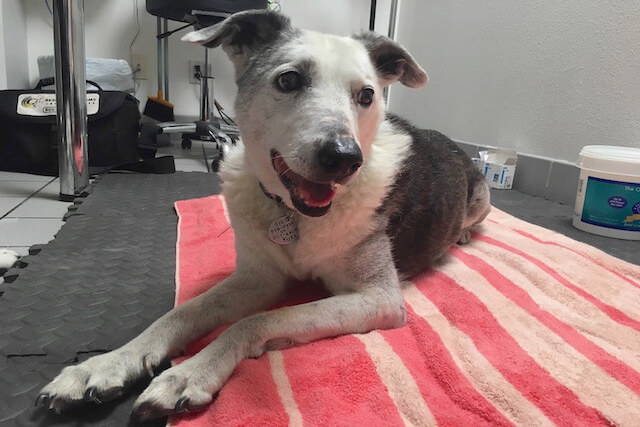Most dogs get all the vitamin B12 they need from their food. But dogs with digestive disorders or other health issues may not be able to absorb enough of it, and the resulting B12 deficiency can cause serious health problems, including diarrhea, weight loss, and even seizures. When AnimalBiome CEO Holly Ganz’s dog Yuki developed pancreatic cancer at the age of 16, for example, her B12 levels plummeted.
B12 and Dogs
Vitamin B12 (also known as cobalamin) is important for many aspects of your dog’s health. It’s crucial for healthy nervous system and brain function, as well as for the formation and growth of blood cells. It’s also involved in intestinal health, so your dog needs B12 to maintain healthy digestion.
Most dogs get plenty of this nutrient from their food. B12 is found in meat (especially organ meat), fish, poultry, eggs, and dairy products. In a healthy dog, the pancreas, intestines, liver, and kidneys are all needed to properly absorb and store this B12. But in a sick dog, one or more of these organs may not be able to do its part.
What are the Symptoms of B12 Deficiency?
Because B12 plays an important role in the body’s absorption of iron, insufficient levels of this vitamin can lead to anemia. Dogs with a B12 deficiency and/or anemia may have one or more of the following symptoms:
- lack of energy
- weakness
- reduced interest in play
- loss of appetite
- diarrhea
- weight loss
- lack of muscle mass
- confusion
- seizures
What Causes B12 Deficiency in Dogs?
The primary cause of B12 deficiency in dogs is a problem with absorption. Certain breeds of dog are genetically predisposed to have difficulty absorbing B12: these include Australian shepherds, border collies, beagles, giant schnauzers, and Chinese Shar-Peis.
In all dogs, the pancreas plays a vital role in the extraction of B12 from food. Therefore, diseases of the pancreas—such as exocrine pancreatic insufficiency (EPI) and pancreatic cancer (as in Yuki’s case)—often lead to B12 deficiency. As a border collie mix, Yuki may also have been a carrier for Intestinal Cobalamin (B12) Malabsorption, the genetic mutation originally found in border collies. At the time, Holly didn’t know that genetic testing for this mutation was available.
Vitamin B12 also affects the interactions among bacteria living in the gut microbiome, and an unbalanced gut microbiome may be at the root of a B12 absorption problem. A good way to learn more about the community of bacteria that live in your dog’s gut is with a microbiome test, which detects bacterial imbalances and provides a detailed breakdown of all the bacteria in your dog’s microbiome, as well as how they compare to the bacteria found in healthy dogs.
The dog gut health test includes personalized recommendations—such as dietary adjustments, supplements (like prebiotics and probiotics), and lifestyle changes—to support and improve your dog’s health. If your dog has been diagnosed with a chronic digestive issue, the assessment report will provide actionable information for you and your veterinarian.
Disorders of the small or large intestine, including inflammatory bowel disease (IBD), can interfere with your dog’s ability to absorb many nutrients, including B12. In fact, a low B12 level is often used as an indicator for gastrointestinal disorders. Veterinarians generally recommend that dogs with chronic GI issues have their B12 level tested.
Can B12 Supplements Help a Sick Dog?
If your dog’s B12 level tests too low, your veterinarian will probably recommend either oral supplements or subcutaneous injections of the vitamin. The treatment is inexpensive and effective. And because B12 is water-soluble, any excess amounts are flushed out with the urine, so it’s very safe.
Holly’s veterinarian showed her how to deliver the subcutaneous injections at home, and soon after Yuki started getting the extra B12, her energy levels increased.
Note that if your dog has been diagnosed with inflammatory bowel disease (IBD) or another chronic GI disorder, treatments for that underlying condition may not be effective until a healthy B12 level has been restored.
More information
For more technical information about vitamin B12 and pet health, see this article from the Veterinary Medicine & Biomedical Sciences department of Texas A&M University.
To learn more about the gut microbiome of dogs, see our article on Dog Gut Health: The 4 Ways to Restore It Naturally.
(Cats need B12 too: here’s more information about B12 deficiency in cats.)
And if your dog has digestive problems, try our microbiome test and Gut Restore Supplements.
Have questions? Contact team@animalbiome.com.
If you liked this article, please consider sharing it.

